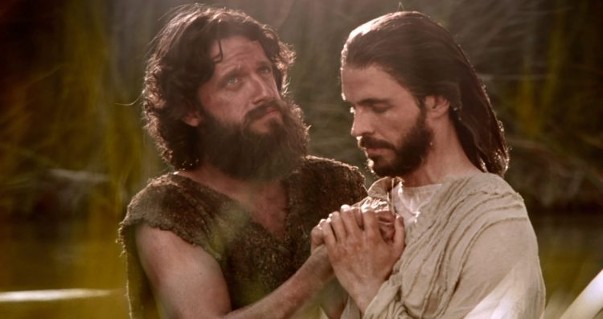|
|
Baptism
Part 1 – The rite of Baptism – The Proper Wording Used In Baptism
|

|
“Go you therefore, and teach all nations, baptizing them in the name of the Father, and of the Son, and of the Holy Ghost [Spirit]: Teaching them to observe all things whatsoever I have commanded you: and lo, I am with you always, even unto the end of the world. Amen” (Matt. 28:19, emphasis added).
Is this, in fact, what the Apostles and the disciples did on and after the day of Pentecost? Did they follow the command of Master Yahushua Messiah (Lord Jesus Christ)? Did they baptize the newly converted individuals “in the name of the Father, and of the Son, and of the Holy Ghost [Spirit]?” There are four examples found in the book of Acts where individuals were baptized.
The first one is found in Acts 2:38 on the day of Pentecost. “Then Peter said unto them, Repent, and be baptized every one of you in the name of Yahushua Messiah for the remission of sins, and you shall receive the gift of the Holy Ghost [Spirit]" (emphasis added). Why only “in the name of Yahushua Messiah?”
In Acts 8:16, we find our second example of a baptism taking place during the days of the early church. “(For as yet He was fallen upon none of them: only they were baptized in the name of the Master Yahushua.)” (emphasis added).
Our third example is “And he commanded them to be baptized in the name of the Master [Yahushua]” (Acts 10:48, emphasis added).
Our fourth example is “And when they heard this, they were baptized in the name of the Master Yahushua” (Acts 19:5, emphasis added).
So why the seeming discrepancy between these verses and what we find written in Matthew 28:19 of the King’s James Version? Did the Apostles and the disciples take it upon themselves to change the wording to be used during the baptism of the new converts? If they did so, where do we find permission for them to do so?
The problem lies much deeper than what appears to be just a change of the wording used in the baptism of individuals. Who is really responsible for this discrepancy we see in what Yahushua supposedly commanded His followers and what His followers actually did? The truth of the matter can be seen in the following statement by Cardinal Ratzinger of the Roman Catholic Church who eventually became the Pope who recently died and a statement found in the Catholic Encyclopedia.
Catholic Cardinal (Eventually Pope Benedict) Joseph Ratzinger made this confession about the origin of the chief Trinitarian support text of Matthew 28:19: “The basic form of our [Matt. 28:19] profession of faith took shape during the course of the second and third centuries in connection with the ceremony of baptism. So far as its place of origin is concerned, the text [Matt. 28:19] came from the city of Rome.” It did not come from the Greek Manuscripts.
“The baptismal formula [in Matt. 28:19] was changed from the name of Jesus Christ [Yahushua Messiah] to the words Father, Son and Holy Spirit by the Roman Catholic Church in the second century.” The Catholic Encyclopedia, II, page 263. The practice of substituting sprinkling for baptism was unheard of until AD 253. This seems to coincide with what the early Roman Catholic Church was doing with Matthew 28:19.
Eusebius cites Matthew 28:19, 20 eighteen times in his work, always in the same form, “Go you make disciples of all nations in My name [Yahushua], teaching them to observe all things, whatsoever I commanded you” (emphasis added). Article in Beauties of the Truth, January 1991 edition.
The truth of this matter is the Papacy was changing and inserting verses not originally found in the Greek manuscripts to support the Trinitarian beliefs and practices that were being brought into the early Christian church from paganism. (See my study on The Deity - Arianism and Daniel 7:24). A text of Scripture the papacy has inserted into the Scriptures is found in 1 John 5:7. "When Erasmus published his version of the Greek New Testament, he left out the addition of 1 John 5:7 from his first two editions (AD 1516, AD 1519), arguing he could not find those words in any Greek manuscript. Pressured by some (Catholics) to include this addition to the Greek text, Erasmus proposed that if they could show him a single Greek manuscript in which the addition was found, he would include it in his next edition. Sure enough, they came up with a purportedly Greek manuscript in which the addition was found, one, which scholars believe was dated from the sixteenth century AD, translated from Latin to the Greek, and added to the Greek text. Erasmus subsequently included it in his AD 1522 edition of the Greek New Testament."
Out of one hundred and thirteen manuscripts, the text is missing in one hundred and twelve. It occurs in no manuscript before the tenth century. The first place the text occurs in Greek is in the Greek translation of the acts of the Council of Lateran, held in AD 1215.
Almost all modern versions and translations correctly omit the words of this verse or put them in italics indicating they are not in the oldest, most reliable manuscripts.
So we find in these verses pertaining to the rite of baptism the “mystery of iniquity,” which Paul talked about in 2 Thessalonians 2:7, already at work during his lifetime, having changed the wording to what we now find in Matthew 28:19 and inserting 1 John 5:7 into the Bible.
“For as many of you, as have been baptized into Messiah [not the Trinity] have put on Messiah” (Gal. 3:27, emphasis added). “Know you not, that so many of us as were baptized into Yahushua Messiah [Jesus Christ] were baptized into His death?” (Rom. 6:3, emphasis added).
|

